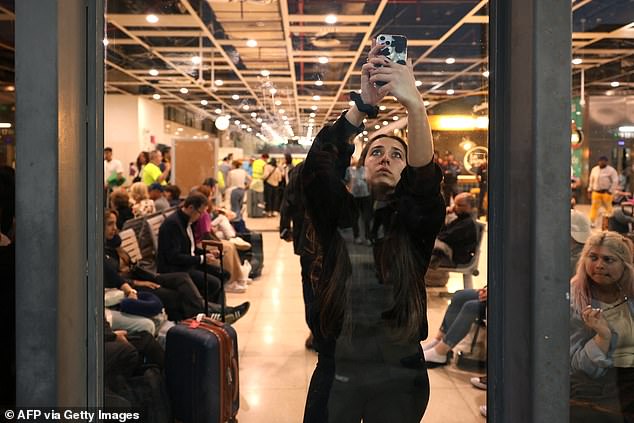All major mobile networks went down in Spain on Tuesday, just four weeks after the country was hit by a national power outage.
Movistar, Orange, Vodafone, Digimobil and O2 were all reported to have been affected by outages hitting professional services, including health centres.
Complaints soared as landline, internet and emergency contact services were knocked offline early this morning.
Madrid, Andalucía, Galicia, the Basque Country, Aragon, Navarra, Extremadura and the Valencian Community were all reportedly affected.
Networks contracted with Telefónica appeared to have been hit, but outages did not appear to be affecting individuals’ network access.
The company told MailOnline shortly after 12.30pm local time (10.30 GMT) the issue has now been resolved, after ‘network upgrade work’ affected ‘some companies’ fixed communication services’.
‘This morning we had an incident that affected the fixed communications services of some companies and public services.
‘We have been working from the outset to restore these services, which have now been fully recovered.
‘We have activated the incident management committee, we have isolated the affected nodes and we have deployed field staff to resolve specific cases arising from this incident, which has now been resolved.’

A traveller raise her phone up to catch network inside Barcelona-Sants rail station during a massive power cut affecting the entire Iberian peninsula and the south of France, in Barcelona on April 28, 2025

Several workers from the Emergency Coordination Center at the 112 headquarters during the widespread blackout. On April 28, 2025, in Seville

People stand inside a supermarket without lights in Burgos on April 28, 2025, amid the outages
Landlines were described as ‘silent’ and the emergency number 112 not working in several parts of the country earlier this morning, Il Corriere reports.
In Spain’s arid south, queues of people formed outside Andalucían health centres as internet connectivity dipped.
Speaking to El Correo de Andalucía, one patient said they arrived for an appointment to find ‘there were no computers, and therefore, they couldn’t process any paperwork’.
Seven in ten complaints flagged by Downdetector this morning referred to fixed internet service.
In the south, the 112 emergency line was briefly out of service from 7.15am until 8.40am. Some health centres were still reporting issues into the late morning.
Health workers in Madrid said they were unable to reach a hospital in the capital.
Emergency phone lines have since been restored in Aragon, near the border with France.
Aragon earlier set up alternative telephone numbers as users reported being unable to reach the emergency services.
Basque authorities, meanwhile, said staff were in constant contact with Telefònica to resolve the incident through the morning.
In Catalonia, the impact was ‘minimal’ and the emergency number has been reachable, El Mundo reports.
Spain was hit by a power outage at the end of last month, causing massive disruption to businesses, public transport and connectivity across the country.
Hundreds of flights were delayed and trains knocked offline, while petrol stations closed and traffic lights went down.

Millions were left without power as public transport and roads ground to a halt in April

The outages caused huge disruption across Spain and Portugal (Sants pictured on April 29)
A British expat in Barcelona told MailOnline that there were huge queues for buses after the outage hit, with the metro knocked offline.
‘Traffic is crazy. The mopeds and motorbikes are heading down the cycle lanes. There are massive queues to catch the bus because without the metro there’s no way that anybody can get home from work,’ they said at the time.
‘There is power in some downstairs premises, so it’s not a total blackout. But internet up here doesn’t work at all. There’s also an eerie silence, apart from the cars. But everything is quiet.’
Spain and Portugal recovered their power supplies a day later.
Spain’s top criminal court, the Audiencia Nacional, said it was investigating whether the blackout was ‘an act of computer sabotage on critical infrastructure’ that could be classified as ‘a terrorism offence’.
The government set up a commission to investigate what triggered the incident, and refused to rule out any hypothesis.
Spain’s grid operator ruled out a cyber attack.
Local media soon began pointing to historic reports warning that the rapid integration of renewable energy sources could cause fluctuations in power levels, potentially leading to widespread blackouts.

A closed petrol station in Villabona on April 28, 2025, during the massive power cut

Several people get money out of several ATMs at the access of a subway station during a blackout hit Spain and Portugal in Madrid

A person walks down a downtown street during a power outage in Malaga during the outages
Just days before, Spain’s power grid ran entirely on renewable energy, including wind, solar and hydro power for the first time.
While sources of energy like wind and solar power are often fairly cheap and ‘secure’, reducing reliance on imports from abroad, their variability and storage issues pose more issues.
Kathryn Porter, an independent energy consultant, said: ‘The more you have wind and solar on the grid, the less stable the grid becomes and so the harder it is to manage faults.
‘I would say there’s a strong chance that the large amount of solar on the system created the conditions for this to be a widespread blackout and made it much worse.’
MailOnline contacted Vodafone for comment.
This article was originally published by a www.dailymail.co.uk . Read the Original article here. .


